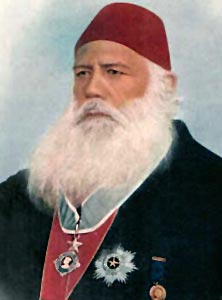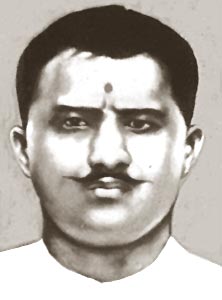 The Progressive Writers` Movement, also acclaimed as Anjuman Tarraqi Pasand Mussanafin-e-Hind, was a progressive literary movement during the pre-partitioned British Indian period, consisting of a bunch of dissimilar writers` groups throughout the world. These writers` groups essentially upheld qualities of being anti-imperialists and left-orientalists and thus assayed to inspire people through their writings, preaching equality and lashing out at social inequality and backwardness.
The Progressive Writers` Movement, also acclaimed as Anjuman Tarraqi Pasand Mussanafin-e-Hind, was a progressive literary movement during the pre-partitioned British Indian period, consisting of a bunch of dissimilar writers` groups throughout the world. These writers` groups essentially upheld qualities of being anti-imperialists and left-orientalists and thus assayed to inspire people through their writings, preaching equality and lashing out at social inequality and backwardness.
Indeed the Progressive Writers` Movement had penetrated to such deep extent that even the then pre-partitioned press and their respected newspaper, the Dawn (presently circulated only in Pakistan) had commented, "Progressive Writers Movement in Urdu literature was the strongest movement after Sir Syed`s (also known as Sir Syed Ahmed Khan, he was an Indian educator and politician, and an Islamic reformer and modernist) education movement. The progressives contributed to Urdu literature some of the finest pieces of fiction and poetry. Undoubtedly, they were the trend-setters for the coming generation of writers, and their role cannot be denigrated or denied."
Progressive Writers` Movement and their association and relation with pan British Indian society and population was such that it witnessed an overwhelming participation of regional writers. As an understandable consequence, the Indian Progressive Writers` Association was set up as far as in London in 1935, which was soon followed by the Progressive Writers` Association being set up in Kolkata in July 1936. Eventually, the All India Writers` Association was seen being established in Lucknow on 10 April 1936, under the leadership of Syed Sajjad Zahir. Some of the most prominent members belonging to this progressive writers` movement can be compiled as being - Sadat Hassan Manto, Ali Jawad Zaidi, Prof. Zoe Ansari, Dr. M. D. Taseer, Faiz Ahmed Faiz, Vijaydan Detha, Sajjad Zaheer, Khagendra Thakur, Bhisham Sahni, Prof. Ahmed Ali, Dr. Nusrat Jehan, Rashid Jahan, Ahmed Nadeem Qasmi, Ahmed Faraz, Kaifi Azmi, Krishan Chander, Ismat Chughtai, Rajinder Singh Bedi, Ali Sardar Jafri, Josh Malihabadi, Majrooh Sultanpuri, Makhdoom Mohiuddin, Munshi Premchand, Firaq Gorakhpuri, Amrita Pritam, Majaz Lucknawi and Sahir Ludhianvi.
The Progressive Writers` Movement, besides bringing these writers to prominent light, had also exceedingly broadened the horizon of Urdu poetry. The movement also had emancipated Urdu from the `classical cliché` and added dollops of fresh vigour and imagery and structure to the poem; it had instilled the rhyming scheme with scintillating zing and introduced and developed new forms like free verse, dramatic and allegorical poems; it lent an ideological substance and utilised the very movement as a tool to the freedom struggle of India. The progressive movement and its writers were triumphant enough to condemn debauchery and skepticism, yet ascertained in this `attitude` an element of protestation against existing conditions; the movement had bettered the treasury of poetic enunciation by employing ordinary and common words, which the older classical Urdu poets had ostracised form the poetic universe and hence turned intimate with the people.
It is quite evident a fact that these numerous progressive poets actually had participated in the Indian freedom struggle with their poetry always on their lips and even penned exceedingly fine poetry from prison as well. With such respected and venerated deeds being performed by the revolutionists and their progressive writers` movement, they had advanced as much as to experiment with prosodic metres even. The poetry that had egressed forth from these luminous men, envisioned great patriots mounting the gallows reciting poetry with arrogant defiance, just like Ram Prasad Bismil who had immortalised these lines of an anonymous poet from Bihar of the same pen name:
sarfaroshi kii tamannaa ab hamaare dil mein hai
dekhanaa hai zor kitnaa baazuu-e-qaatil mein hai
 These radical writers had branded themselves with a patriotic movement, whose slogan was Inquilab Zindabad (long live the revolution), shouted from the height of the gallows by another martyr, Bhagat Singh, who was legendary to quote poetry at liberty in his letters, which he had penned from his death cell. And this very slogan `Inquilab Zindabad` was employed by all freedom-fighters including celebrated men like Nehru and Gandhi, the two words which are absolutely identified with Indian Independence in world history. The Progressive Writers` Movement and their clandestine members were habitual to held meetings, attended by thousands of people, which resounded and reverberated with this slogan and the word Inquilab henceforth became a household word in India.
These radical writers had branded themselves with a patriotic movement, whose slogan was Inquilab Zindabad (long live the revolution), shouted from the height of the gallows by another martyr, Bhagat Singh, who was legendary to quote poetry at liberty in his letters, which he had penned from his death cell. And this very slogan `Inquilab Zindabad` was employed by all freedom-fighters including celebrated men like Nehru and Gandhi, the two words which are absolutely identified with Indian Independence in world history. The Progressive Writers` Movement and their clandestine members were habitual to held meetings, attended by thousands of people, which resounded and reverberated with this slogan and the word Inquilab henceforth became a household word in India.
This Progressive Writers` Movement emanated a spectrum of dissimilar and assorted shades of political and literary opinions with Prem Chand, a confirmed believer in Gandhism at one end and Sajjad Zaheer, a confirmed Marxist, at the other end. In between them there existed umpteen other shades, including non-conformists, but every one of them were blatantly interested only in the freedom of the country and glory of literature.
The basic and elementary posit and proposal of the Progressive Writers` Movement was the total unification of art, its use and further beautification. Viewed from an unbiased angle, it was not a fierce departure from the past or a heated revolt against tradition as such. Nevertheless, the movement activists did reject certain injurious and hair-splitting trends. And that was precisely how these writers and their progressive movement stood out from the mass. What they tried to accomplish was a reverberation of the values that were almost lost in time, particularly, the modern commercial age, or falsified under the weight of the crumbling social systems. The movement was a kind of `rediscovery` with a fresh experience and consciousness and new artistic additions, lending novel vitality to Urdu poetry and literature as a whole. As was then conceived by pro-British advisers, that the Progressive Writers` Movement was a few hot-headed men getting together to launch a literary and artistic movement of such a dimension, was grossly false a notion, baseless as is proved today.













